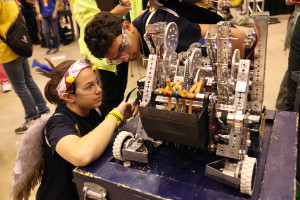Congratulations to Chibueze Amanchukwu; Christopher Arges; Marm Dixit; Marta Hatzell; and Siddharth Komini Babu; the winners of the 2021-2022 ECS Toyota Young Investigator Fellowship for Projects in Green Energy Technology. ECS and the Toyota Research Institute of North America (TRI-NA), a division of Toyota Motor Engineering & Manufacturing North America, Inc. (TEMA), chose the five recipients who are pursuing innovative electrochemical research in green energy technology. Through this fellowship, ECS and Toyota encourage young professionals and scholars to pursue battery and fuel cell research, and hope to see further innovative and unconventional technologies born from electrochemical research.
2021-2022 ECS Toyota Young Investigator Fellows
Chibueze Amanchukwu, University of Chicago
“Synthesis of novel perfluoroether polymer electrolytes for energy-dense solid-state lithium metal batteries”
Chibueze Amanchukwu is Neubauer Family Assistant Professor at the University of Chicago. He received his PhD in Chemical Engineering from the Massachusetts Institute of Technology (2017), with Paula Hammond as advisor. Amanchukwu pursued postdoctorate study at Stanford University with Zhenan Bao (2017-2019) and the University of Cambridge with Clare Grey (2019). His research on electrolyte design for next generation lithium batteries has been recognized by awards including the 2021 3M Nontenured Faculty Award; 2017-2019 Stanford University TomKat Center Postdoctoral Fellowship in Sustainable Energy and California Alliance Postdoctoral Fellowship; 2014-2017 National Defense Science and Engineering Graduate Fellowship; 2014 MIT-Imperial College London Global Fellowship; 2012 Texas A&M ChemE Outstanding Graduating Student Award; and 2011 Texas A&M Craig Brown Outstanding Senior Engineer Award. He has published 19 articles with an h-index of 14 and filed one patent. Amanchukwu serves on the Community Board of Materials Horizon. (more…)






